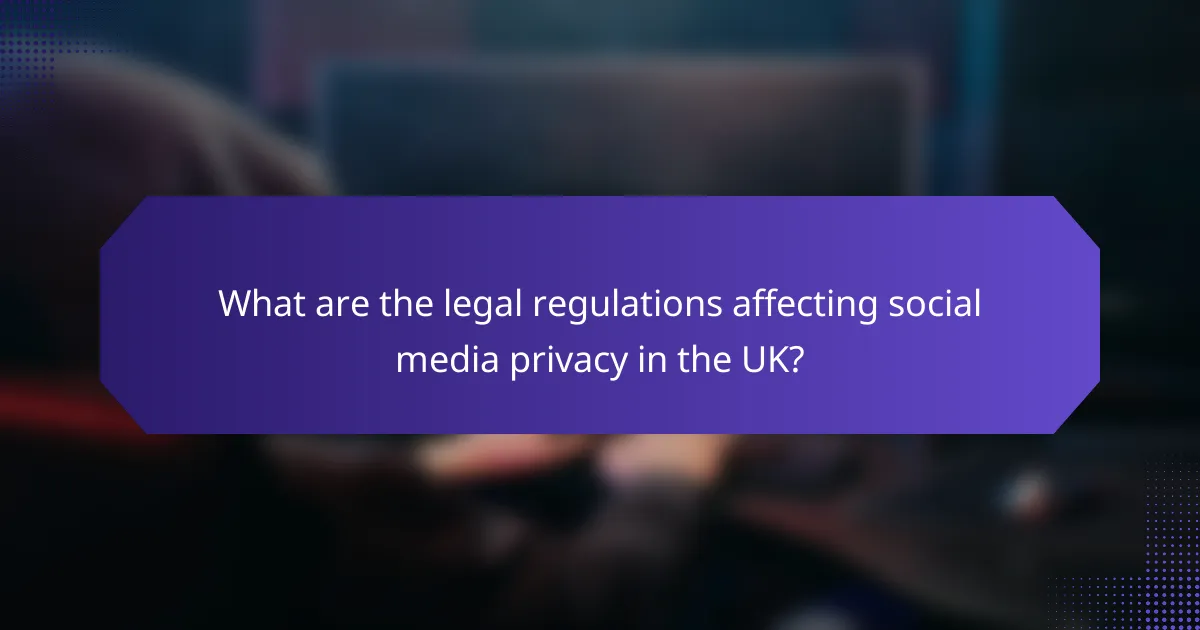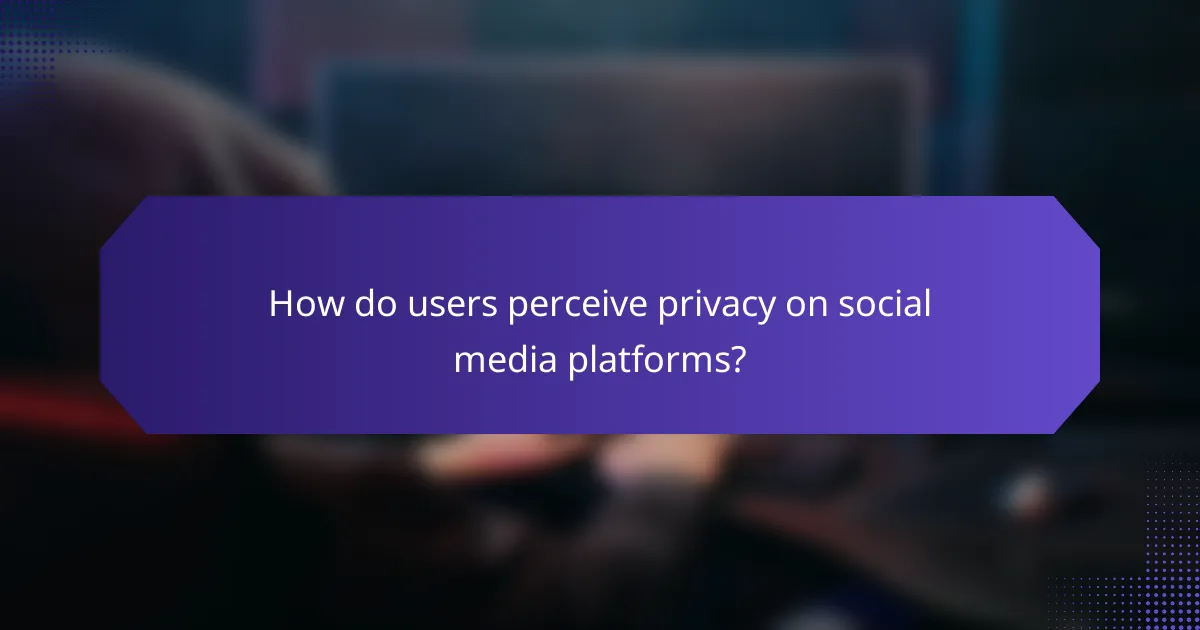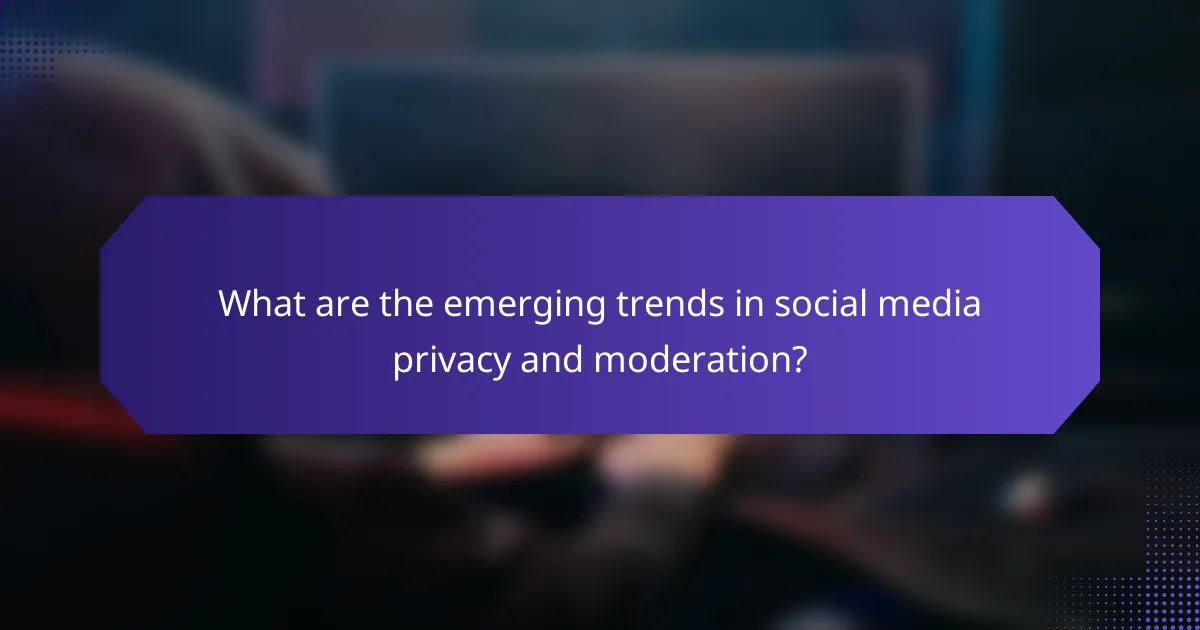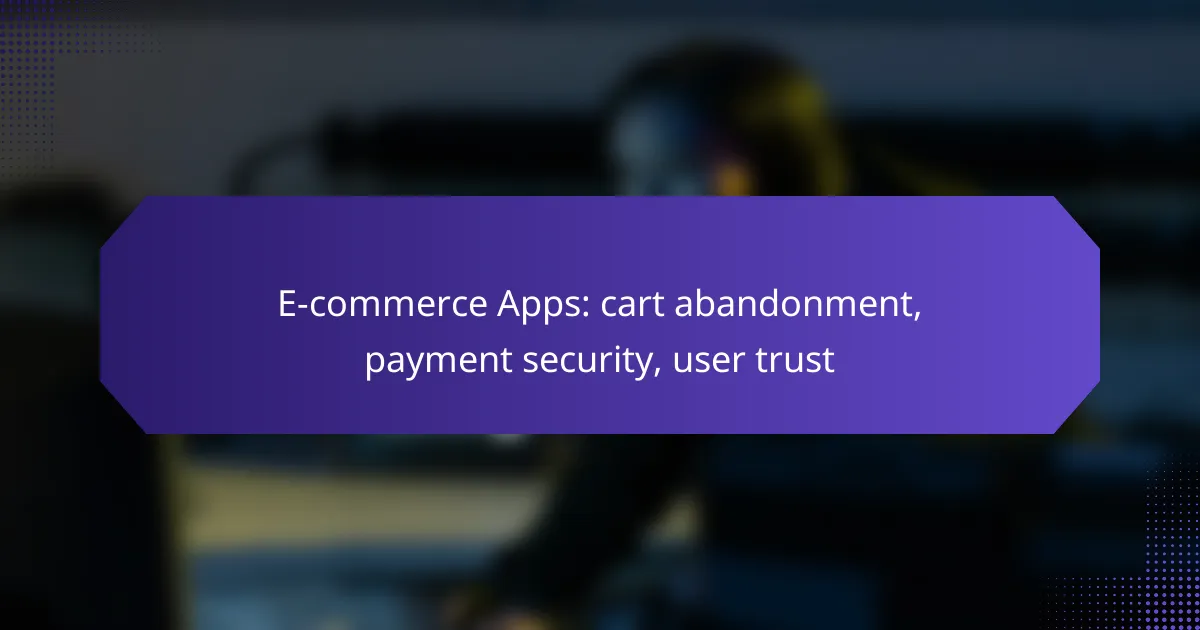Social media apps have become integral to modern communication, yet they raise significant privacy concerns regarding user data collection and sharing practices. Balancing content moderation with user engagement poses additional challenges, as platforms strive to create safe environments while promoting interaction. Understanding these dynamics is crucial for users navigating the complexities of social media today.

What are the privacy concerns with social media apps in the UK?
Privacy concerns with social media apps in the UK primarily revolve around how user data is collected, consented to, and shared with third parties. Users often face challenges in understanding their rights and the extent of data usage, which can lead to potential misuse of personal information.
Data collection practices
Social media apps typically collect a wide range of user data, including personal information, location data, and user interactions. This data collection often occurs through various means, such as tracking cookies and app permissions. Users should be aware that the more data they share, the more their privacy may be compromised.
For instance, apps may request access to contacts or location services, which can lead to unintentional data exposure. Users should regularly review app permissions and limit access to only what is necessary for functionality.
User consent issues
User consent is a critical aspect of privacy in social media apps, yet many users do not fully understand what they are agreeing to when they accept terms and conditions. Often, these agreements are lengthy and filled with legal jargon, making it difficult for users to grasp the implications of their consent.
In the UK, the General Data Protection Regulation (GDPR) mandates that consent must be informed, specific, and revocable. Users should take the time to read privacy policies and consider opting out of data collection where possible.
Third-party data sharing
Many social media platforms share user data with third parties, including advertisers and analytics companies. This practice raises significant privacy concerns, as users may not be aware of how their data is being used or who it is being shared with.
To mitigate risks, users can adjust privacy settings to limit data sharing and review which third-party apps have access to their social media accounts. Being cautious about what information is shared can help protect personal privacy.

How do social media apps handle content moderation?
Social media apps manage content moderation through a combination of community guidelines, automated tools, and user feedback. These methods aim to create a safe environment while balancing freedom of expression and user engagement.
Community guidelines enforcement
Community guidelines outline the acceptable behavior and content on social media platforms. Enforcement typically involves reviewing reported content and applying penalties such as warnings, temporary suspensions, or permanent bans based on the severity of violations.
Platforms often provide transparency reports detailing the number of actions taken against violations. Users should familiarize themselves with these guidelines to avoid unintentional breaches.
AI moderation tools
AI moderation tools assist in identifying and filtering inappropriate content quickly. These algorithms analyze text, images, and videos to detect hate speech, violence, or misinformation, often operating in real-time.
While AI can handle large volumes of content efficiently, it may struggle with context and nuance. Therefore, human moderators often review flagged content to ensure fair assessments and avoid misinterpretations.
User reporting mechanisms
User reporting mechanisms empower individuals to flag content that violates community standards. Most platforms provide easy-to-use reporting buttons next to posts, allowing users to submit complaints directly.
After a report is submitted, the platform typically investigates the issue, which may take anywhere from a few hours to several days. Users should utilize these mechanisms responsibly to maintain a constructive community environment.

What strategies improve user engagement on social media?
To enhance user engagement on social media, platforms often employ strategies that foster interaction, personalization, and continuous improvement. These approaches not only attract users but also encourage them to spend more time on the app, ultimately increasing overall activity.
Interactive content formats
Interactive content formats, such as polls, quizzes, and live videos, significantly boost user engagement by inviting participation. These formats create a two-way communication channel, allowing users to express their opinions and preferences directly.
For example, a brand might use a poll on Instagram Stories to ask followers about their favorite product features. This not only engages users but also provides valuable insights for the brand.
Personalized user experiences
Personalization is key to keeping users engaged on social media. By analyzing user behavior and preferences, platforms can tailor content to individual users, making their experience more relevant and enjoyable.
For instance, Facebook uses algorithms to show users posts that align with their interests, increasing the likelihood of interaction. Users are more likely to engage with content that resonates with them personally.
Regular updates and features
Frequent updates and the introduction of new features help maintain user interest and engagement. Social media platforms that regularly refresh their offerings can keep users curious and eager to explore.
For example, TikTok frequently rolls out new editing tools and effects, encouraging users to create and share fresh content. This strategy not only retains existing users but also attracts new ones looking for innovative ways to engage.

What are the legal regulations affecting social media privacy in the UK?
In the UK, social media privacy is primarily governed by the General Data Protection Regulation (GDPR) and the UK Data Protection Act 2018. These regulations set strict guidelines on how personal data must be handled, ensuring user privacy and data protection.
General Data Protection Regulation (GDPR)
The GDPR is a comprehensive data protection law that applies to all organizations processing personal data of individuals within the European Union, including the UK. It mandates that social media platforms obtain explicit consent from users before collecting or processing their data.
Key principles of the GDPR include data minimization, purpose limitation, and transparency. For instance, users must be informed about how their data will be used and have the right to access, rectify, or erase their information. Non-compliance can result in hefty fines, often reaching millions of euros.
UK Data Protection Act 2018
The UK Data Protection Act 2018 complements the GDPR by providing additional provisions specific to the UK context. It establishes the Information Commissioner’s Office (ICO) as the regulatory authority responsible for enforcing data protection laws and overseeing compliance.
This Act includes specific rules regarding the processing of sensitive personal data, such as health information or political opinions. Social media companies must ensure they have a lawful basis for processing such data and must implement appropriate security measures to protect it.

How do users perceive privacy on social media platforms?
Users often view privacy on social media platforms with skepticism, primarily due to concerns about data collection and usage. Many individuals feel that their personal information is vulnerable to misuse, leading to a general distrust of these platforms.
Trust levels among users
Trust in social media platforms varies significantly among users, influenced by past experiences and the transparency of the platform regarding data handling. Some users may trust well-established platforms like Facebook or Instagram, while others prefer newer, privacy-focused alternatives such as Signal or Telegram.
Surveys indicate that a substantial portion of users express distrust towards social media companies, often citing concerns over how their data is shared with third parties. This distrust can lead to decreased engagement and a reluctance to share personal information.
Impact of data breaches
Data breaches can severely impact user trust and engagement on social media platforms. When breaches occur, they often lead to sensitive user information being exposed, which can result in identity theft or unwanted solicitation.
Following a significant data breach, platforms typically see a decline in user activity and an increase in account deletions. Users are more likely to reconsider their presence on platforms that have experienced breaches, especially if they feel their privacy has been compromised.

What are the emerging trends in social media privacy and moderation?
Emerging trends in social media privacy and moderation focus on enhancing user control and transparency while addressing content management challenges. As users become more aware of privacy risks, platforms are adapting their policies and technologies to foster safer online environments.
Increased transparency initiatives
Many social media platforms are implementing increased transparency initiatives to build user trust. This includes clearer privacy policies, detailed explanations of data usage, and regular reports on content moderation practices. For example, platforms may publish transparency reports that outline the number of content removals and the reasons behind them.
These initiatives often involve user-friendly dashboards where individuals can see how their data is being used and what content moderation actions have been taken on their posts. This level of transparency can empower users to make informed decisions about their engagement on these platforms.
Decentralized social networks
Decentralized social networks are gaining traction as alternatives to traditional platforms, aiming to enhance user privacy and control. Unlike centralized systems, these networks distribute data across multiple nodes, reducing the risk of data breaches and censorship. Users can retain ownership of their data and choose how it is shared.
Examples of decentralized networks include Mastodon and Diaspora, which allow users to create their own servers and communities. While these platforms promote privacy, they may face challenges in user engagement and content moderation, as the decentralized nature can complicate the enforcement of community standards.










